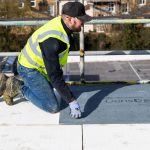Can fibreboard be used for roof sheathing?

Can fibreboard be used for roof sheathing?
Various types of wood fibreboards have been, and continue to be used, for wall and roof sheathing. Fibreboards are manufactured from a mix of materials, including plant fibre, that gives the boards high structural stability. This blog will consider gypsum fibreboards and why they are becoming increasingly popular for roof sheathing in modern, sustainable construction.
The reinforced boards are manufactured under high pressure from gypsum and a cellulose fibre mix. The resulting panels are lighter and relatively easy to install, yet they provide low slope and flat roof build ups with the same benefits that traditional roof sheathing offers, including:
- Strength and durability
- Resilience and resistance to elements
- Increased structural integrity
The benefits of gypsum fibreboards, also known as cover boards, extend far beyond sustainability credentials and faster installation. This is especially the case with engineered fibreglass mat face gypsum cover boards.
Are roof build ups with fibreglass mat face gypsum cover boards more robust and durable?
The strength and durability of the DensDeck® Prime Roof Board with EONIC® Technology were tested by Trinity ERD in Columbia, South Carolina, in October 2016 and December 2017. The tests showed that a dry ½ inch (12.7mm) DensDeck® Prime Roof Board is 52% stronger than alternative gypsum fibre and 57% stronger than alternative coated glass mat gypsum board.
One of the key performance benefits of cover boards is the increased moisture resistance for adhered, semi-adhered and mechanically fixed roof assemblies. Gypsum core boards are engineered to resist moisture absorption, unlike cementitious boards designed to absorb moisture. The addition of EONIC® Technology doubles the moisture absorption resistance of DensDeck® Prime Roof Board on both sides of the board when compared to a standard gypsum core cover board. This means maximum 5% total water absorption resistance by weight and 1-gram nominal surface water absorption performance on both sides of the board.
The same tests conducted on dry DensDeck® Roof Board were performed after a standard 2-hour soak test. Here DensDeck® Roof Board was 87% stronger than alternative mat face gypsum and 267% stronger than gypsum fibre board.
How do fibre mat facer gypsum core enhance the performance of flat roof systems?
DensDeck® Roof Board significantly improves the vertical pull resistance of low slope and flat roof build ups. The results of a vertical pull strengths test conducted by PRI Construction Materials in October 2017 in the US were in favour of DensDeck® Roof Board. The board was 74% stronger on the face and 14% stronger on the back than alternative gypsum fibre cover boards. Compared with alternative glass coated mat gypsum, the cover board was 2.5 times stronger on the face and 7 times stronger on the back.
Gypsum core cover board forms a solid and homogenous substrate compatible with most adhered and partially adhered roofing membranes. This helps protect the insulation layer below the cover board from compression of roof foot traffic or mechanical loads of plant on the roof. It also protects the roof membrane from punctures caused by hail, dropped tools, flying debris and other accidental events. The addition of glass fibre mat facers to the gypsum core cover board makes the spread of adhesives easier and more even, helping with a high quality finish.
The improved mat to core bond and the higher bond strength between the waterproofing membrane and the cover board are crucial for the overall wind uplift resistance improvements of roofing systems that use the DensDeck® Roof Board. The addition of mat facer gypsum core cover boards can help extend the design life of buildings and significantly reduce the maintenance requirements.
What are the fire performance benefits of fibreglass mat face gypsum cover boards for commercial flat roof build ups?
The chemical make-up of fibreglass mat face gypsum core cover board, such as DensDeck® Roof Board, plays a crucial role in the performance enhancements it can offer.
Both fibreglass and gypsum are non-combustible materials. Gypsum contains 21% chemically combined water and 79% inert calcium sulphate. In the event of a fire, the resulting heat releases the chemically bonded water as water vapour. This helps to slow the spread of fire. When tested in accordance with BS ES 13501-1, DensDeck® Roof Board was classified to have A1 reaction to fire.
To find out more about DensDeck® Roof Board and see how the specification of cover boards can improve the performance of your flat or low slope roof systems, contact our specialist team.
Contact Us
Start your project or simply get specification advice by dropping us a message.
One of our team will be in touch as soon as possible.